Instructional Strategies-Technology

Padlet is a virtual wall where users can post comments, questions, and resources. It's a versatile tool that can be used for a variety of purposes, including: discussion boards, class blogs, group discussions and activites.
Canva is an online design platform that allows users to create graphics, documents, and visuals. It offers a variety of templates, images, fonts, and other elements that can be customized to create professional-looking designs.
Socrative is a web-based platform that allows teachers to create and deliver quizzes, polls, and other interactive assessments to their students. It's a valuable tool for gauging student understanding in real-time and fostering active learning within the classroom.
Diffit is an AI-powered tool designed specifically for educators to simplify the process of differentiating instruction and creating engaging learning materials. It allows teachers to easily adapt existing content, like articles or videos, to different reading levels, ensuring all students can access and comprehend the material.
Magic School AI is an innovative teaching tool that leverages artificial intelligence to provide educational experiences. The platform is visually appealing and user-friendly, making it easy for both teachers and students to navigate.
Trello is a visual project management tool that allows teams to organize tasks, workflows, and projects. It uses a Kanban-style system, which is a popular methodology for lean management.
Piktochart is a web-based graphic design tool and infographic maker that helps users create visually appealing presentations, reports, infographics, and other visual content without the need for extensive design experience.
Essentially, it's a user-friendly platform that empowers individuals to transform data and information into engaging visuals.
Pear Assessment (formerly Edulastic) is an online assessment platform designed to help educators create, administer, and analyze assessments for students. It offers a variety of features to streamline the assessment process and provide valuable insights into student learning.

G Suite for Education, formerly known as Google Apps for Education, is a collection of Google tools that help teachers create virtual classrooms and engage with students. Google Docs, Slides, Sheets, Sites, and Google Classroom are essential tools for the 21st century classroom.

FigJam.com is a free online whiteboard that helps teams collaborate and brainstorm in real time. It's designed to make planning, brainstorming, and teaching more interactive.

Desmos, for teachers, is a free online platform that provides a powerful graphing calculator and interactive tools to create engaging math lessons, allowing them to build visual, dynamic activities where students can explore mathematical concepts through graphs, sliders, and multiple representations, making learning more interactive and accessible for all levels; essentially, it acts as a robust teaching tool to enhance student understanding of math concepts through visual exploration and real-time feedback.
Wordwall is an online platform designed to help teachers create an array of interactive and engaging class activities for students in person or online. This platform provides various templates for teachers to select from. All an instructor needs to do is supply the content and Wordwall will automatically generate the materials for the class.
QuestionWell is an AI-powered tool designed for teachers that generates questions based on provided text, like a lesson plan or a website, allowing them to quickly create quizzes and assessments aligned with learning objectives, essentially saving time by automatically generating questions instead of writing them manuall
Blooket is a web-based learning platform that uses games to help students review and learn new concepts. Teachers can create their own games or use existing ones to engage students in interactive learning.
Gimkit is an online platform where teachers can create interactive quiz-style games for students to play, where they earn virtual currency by answering questions correctly, which they can then use to purchase power-ups and compete against classmates, essentially turning learning into a game-show style experience with a competitive edge; it's often used in classrooms as a way to engage students with the material being taught.

















